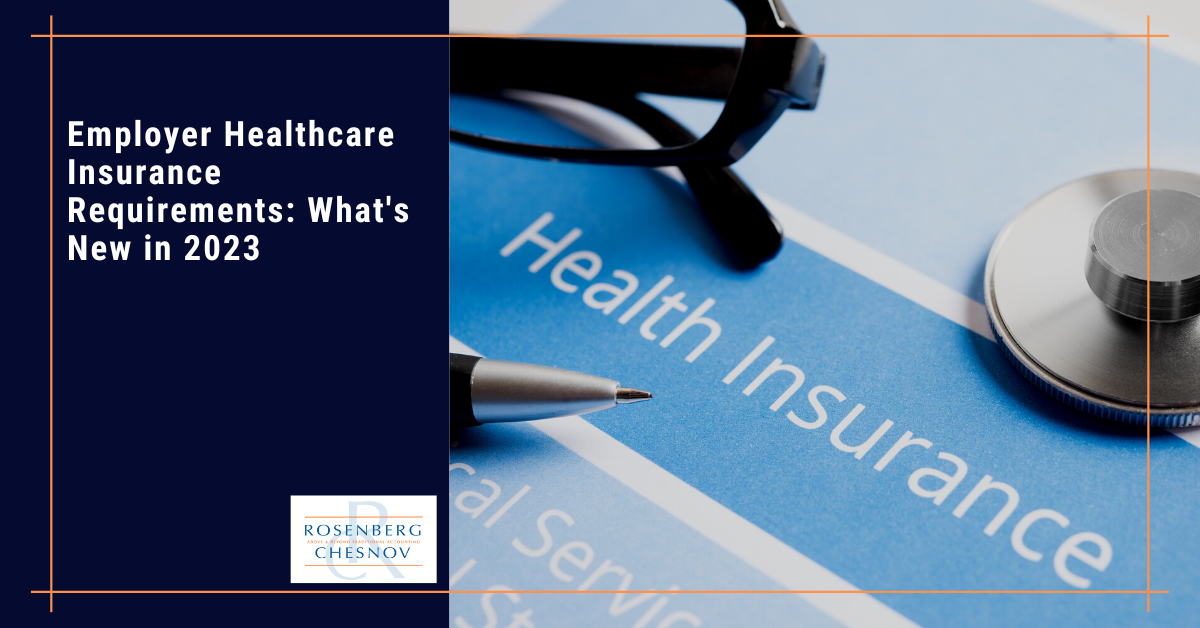

Maximize Your 2024 Refund: Tax Breaks You Might Be Missing
Category: Accounting
For employers, navigating the constantly evolving landscape of healthcare insurance requirements is always challenging. However, 2023 has brought its own unique set of challenges and considerations.
Complex regulations, changing standards, tighter enforcement, harsher consequences, and less room for error mean a strong understanding of the requirements will be more important than ever this year for employers who want to avoid significant penalties.
In this post, we’ll explore the healthcare insurance requirements for employers, changes to affordability thresholds and enforcement in 2023, and increased penalties for non-compliance this year. To discover how you can ensure compliance and what considerations to consider for the future, continue reading below.


Let’s begin by reviewing the basics of the employer mandate under the Affordable Care Act (ACA).
Also known as the “employer shared responsibility” or the “pay or play” provisions, the employer mandate is a crucial component of the ACA. This provision, signed into law along with the rest of the Act in 2010, requires certain employers to offer their full-time employees and dependents health insurance coverage or face potential penalties.
Generally speaking, employers subject to the mandate must offer health insurance plans that meet specific minimum standards, including providing essential health benefits and being affordable to employees.
If an employer fails to meet these requirements and at least one of their full-time employees receives a premium tax credit or subsidy for purchasing coverage through the Health Insurance Marketplace, the employer may be penalized.
However, not all employers are subject to this requirement.
Only “applicable large employers” (ALEs) must meet the employer mandate requirements. Put simply, this means employers who have an average of 50 or more full-time employees, including full-time equivalent (FTE) employees, during the preceding calendar year. (The IRS generally defines a full-time employee as one who works, on average, at least 30 or more hours per week.)
Broadly, the mandate stipulates that such ALEs must offer affordable health insurance coverage to at least 95% of their full-time employees and their dependents. This coverage must extend to the end of the month in which employees turn 26.
However, small businesses with fewer employees that do not qualify as ALEs do not need to offer health coverage. As some 99% of companies in the United States are small businesses, the employer mandate does not impact most U.S. employers. That said, a majority of these employers choose to offer voluntary health benefits as incentives to attract top talent all the same — in fact, nearly half of all workers in the U.S. private sector had health insurance available to them through their employers in 2019, even though most of those employers were not subject to the ACA mandate.
It’s also worth clarifying that no federal law requires any company of any size to offer healthcare coverage. So employers can technically disregard the ACA mandate — if they’re willing to shoulder the significant penalties this decision would incur.
In 2023, several significant changes have occurred regarding the employer mandate. For employers, these changes directly impact compliance, impacting the affordability threshold and potential penalties.
Here are two major changes to the ACA employer mandate in 2023:
Together, these two developments mean that it is more vital than ever for employers to ensure compliance and avoid penalties.
Another prominent change in 2023 revolves around the issue known as the “family glitch.”
Previously, if an employee’s self-only coverage met affordability thresholds, it could prevent family members from accessing premium tax credits through the ACA exchange, even if the employer-sponsored family coverage was unaffordable. The Department of the Treasury and the IRS introduced a new rule to address this.
Starting January 1, 2023, a separate affordability test is now applied to an employee’s spouse and dependents. If the required contribution for family coverage exceeds the affordability threshold, family members can qualify for premium tax credits and purchase subsidized coverage on the ACA exchange.
Finally, there is another challenge for employers in 2023: good-faith penalty relief is no longer in effect for employers.
In the past, when a company’s reporting was incorrect or incomplete, that company could attempt to show that it had made a good-faith effort to comply with ACA requirements. If the IRS found that they had done so, they could be eligible for good-faith relief from penalties.
In 2023, that will not be the case; employers will be held accountable for not abiding by ACA requirements. On top of the boost in enforcement activities, employers must take extra care to avoid penalties.
More distressing news: penalties are up in 2023.
Here are two types of penalties employers could encounter:
These penalties underscore the importance of ensuring that coverage meets the necessary criteria.
All applicable large employers must file an annual report that ensures compliance with the employer mandate.
The filing, using Forms 1094-C/1095-C, includes information on all employees offered and accepted coverage and the cost of that coverage on a month-by-month basis.
The deadline for submitting is March 31. While the deadline for employee distribution has been extended each year, it’s now permanently extended, and this year, an additional 30-day extension has been granted, setting the deadline for providing employee forms on March 2.
It’s also relevant to note that there is a progressive penalty structure for late filings.
The first tier covers April 1 to April 30, imposing a penalty of $50 per form for any forms submitted or corrected during this period. The second tier extends from May 1 to August 1, with a higher penalty of $110 per form for forms filed within this timeframe.
After August 2, a more significant penalty of $280 per form is applied to late submissions.
Employers should meticulously evaluate their offered coverage to ensure compliance with healthcare insurance requirements in 2023 and beyond. Calculating affordability and understanding minimum value standards are also key.
The landscape of healthcare insurance requirements for employers will likely continue shifting and evolving in years to come. Staying updated on IRS guidelines and maintaining accurate records are essential to a proactive compliance strategy.
With penalties at stake, taking proactive measures to offer comprehensive and compliant coverage to employees is crucial to fostering a healthy and thriving workforce.
If you are a client and would like to book a consultation, call us at +1 (212) 382-3939 or contact us here to set up a time.
If you aren’t a client, why not? We can take care of your accounting, bookkeeping, tax, and CFO needs so that you don’t have to worry about any of them. Interested? Contact us here to set up a no-obligation consultation.
Interested in receiving updates in your mailbox? Check out our newsletter, which is full of information you can use. It comes out once every two weeks, and you can register for it below.


Category: Accounting


Category: Accounting


Category: Accounting
Send us a message and we will contact you as soon as possible.
Send us a message and we will contact you as soon as possible.
Jeff Coyle, CPA, Partner of Rosenberg Chesnov, has been with the firm since 2015. He joined the firm after 20 years of business and accounting experience where he learned the value of accurate reporting, using financial information as a basis for good business decisions and the importance of accounting for management.
He is a diligent financial professional, able to manage the details and turn them into relevant business leading information. He has a strong financial background in construction, technology, consulting services and risk management. He also knows what it takes to create organizations having built teams, grown companies and designed processes for financial analysis and reporting.
His business experience includes:
Creating and preparing financial reporting, budgeting and forecasting.
Planning and preparation of GAAP and other basis financial statements.
Providing insight on financial results and providing advice based on those results.
Jeff also has a long history of helping individuals manage their taxes and plan their finances including:
Income tax planning and strategy.
Filing quarterly and annual taxes.
Audit support.
General financial and planning advice.
Prior to joining the firm in 2015, Jeff was in the private sector where he held senior financial and management positions including Controller and Chief Financial Officer. He has experience across industries, including construction, technology and professional services which gives him a deep understanding of business.
Jeff graduated from Montclair State University, he is a CPA and member of the American Institute of Certified Public Accountants, New York State Society of Certified Public Accountants and New Jersey State Society of Public Accountants.
Jody H. Chesnov, CPA, Managing Partner of Rosenberg Chesnov, has been with the firm since 2004. After a career of public accounting and general management, Jody knows the value of good financials. Clarity, decision making, and strategy all start with the facts – Jody has been revealing the facts and turning them into good business results for more than three decades.
He takes a pragmatic approach to accounting, finance and business. His work has supported many companies on their path to growth, including helping them find investors, manage scaling and overcome hurdles. His experience and passion for business reach beyond accounting and he helps businesses focus on what the numbers mean organizationally, operationally and financially.
He has a particular expertise in early-stage growth companies. His strengths lie in cutting through the noise to come up with useful, out of the box, solutions that support clients in building their businesses and realizing their larger visions.
Prior to joining the firm in 2004, Jody was in the private sector where he held senior financial and management positions including General Manager, Chief Financial Officer and Controller. He has experience across industries, which gives him a deep understanding of business.
Jody graduated with a BBA in Accounting from Baruch College, he is a CPA and member of the American Institute of Certified Public Accountants and New York State Society of Certified Public Accountants.
In addition to delivering above and beyond accounting results, Jody is a member of the NYSCPA’s Emerging Tech Entrepreneurial Committee (ETEC), Private Equity and Venture Capital Committee and Family Office Committee.
He is an angel investor through the Westchester Angels, and has served as an advisor for many startup companies and as a mentor through the Founders Institute.